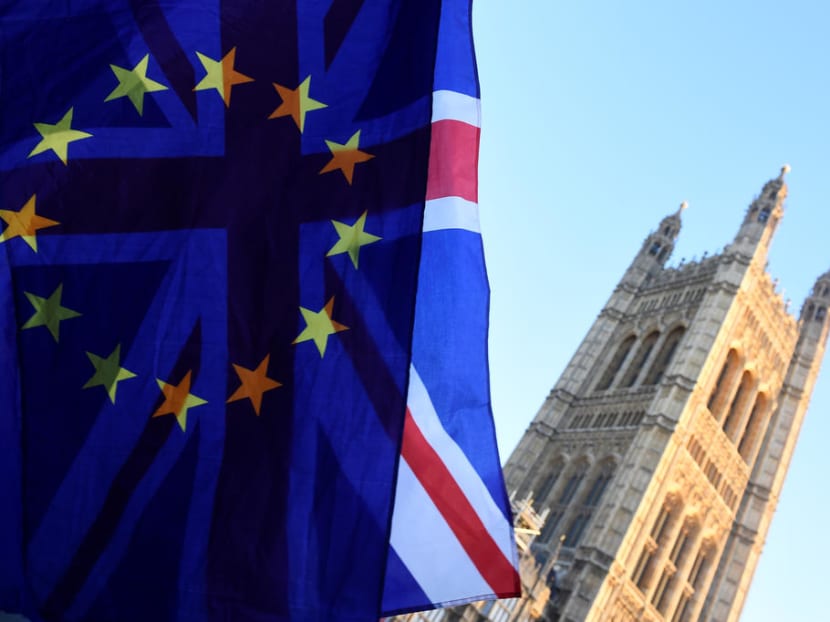From the US to Germany, the consequences of foreign interference
SINGAPORE — At a conference on foreign-interference tactics and countermeasures on Wednesday (Sept 25), Home Affairs and Law Minister K Shanmugam described foreign interference in the domestic affairs of countries as an “age-old threat”. He said legislation was necessary and the state cannot take a hands-off approach. Here is a look at how foreign interference has permeated other countries, and some of the repercussions.

Disinformation peddled online by foreign-linked players before the June 2016 vote in the United Kingdom over leaving the European Union could have affected the Brexit vote. The UK remains deeply divided in the wake of the vote.
SINGAPORE — At a conference on foreign-interference tactics and countermeasures on Wednesday (Sept 25), Home Affairs and Law Minister K Shanmugam described foreign interference in the domestic affairs of countries as an “age-old threat”. He said legislation was necessary and the state cannot take a hands-off approach. Here is a look at how foreign interference has permeated other countries, and some of the repercussions.
2016 UNITED STATES PRESIDENTIAL ELECTION
What happened
Scores of bots (automated accounts), fake social-media pages and sophisticated tools were used, for instance, to create fictitious Americans, and shape them into leaders of public opinion.
One Twitter account set up by a foreign entity, for instance, masqueraded as an ordinary American woman named Jenna Abrams. With tens of thousands of followers, the account, which pushed divisive views on immigration and segregation, was quoted by international broadcasters BBC and CNN as well as The New York Times and The Washington Post.
In another example, a foreign group disseminated a video that claimed to show a policeman in Atlanta, Georgia, shooting an African-American woman. The aim was to widen the divide between the African-American community and the police, and to undermine the police as an institution.
The consequences
The interference may have swayed the way some Americans voted.
Voters who learnt that foreign entities had a hand in the election were more likely to distrust the electoral results and lose faith in American democracy. Public disapproval also rose with the level of intervention, based on a Washington Post survey last year.
The Washington Post survey also found that foreign influence resulted in partisan divides over the extent to which they disapproved of such foreign activity, for example.
Another corollary of foreign interference is that it led to a greater distrust of public institutions.
2016 UNITED KINGDOM BREXIT REFERENDUM
What happened
Foreign-linked social-media accounts drummed up anti-immigration falsehoods that made the British public feel threatened, concocting a narrative of a British government failing to protect its citizens.
Data scientists from Swansea University in Wales and the University of California, Berkeley in the United States found more than 150,000 Russia-based accounts that posted more than 45,000 pro-Brexit messages in the two days leading to the referendum on the UK’s departure from the European Union in June 2016.
City, University of London researchers also found more than 13,000 suspected bots that churned out mostly pro-Brexit messages on Twitter, which were removed in the weeks after the vote.
The consequences
The foreign interference could have swayed Britons to vote to leave the European Union.
The 2019 Edelman Trust Barometer, which measures trust in government, business, non-governmental organisations and the media, found that 68 per cent of Britons wanted to see change and 53 per cent believed the sociopolitical system was failing them. About seven in 10 respondents felt that fellow citizens had become angrier about politics and society since the Brexit referendum, and one in six said they had fallen out with friends or relatives over the vote.
UKRAINE
What happened
A concerted campaign in 2014 to undermine trust in a new Ukrainian government after a revolution saw the ousting of the administration of then-president Viktor Yanukovych.
This included efforts to undermine trust in the army and government, portraying the new regime as a fascist, xenophobic, racist and anti-Semitic junta. A “foreign power” was found to have circulated messages aimed at eroding trust in the Ukrainian Armed Forces.
Bots and fake social-media accounts were used to blame the Ukrainian government for the downing of Malaysia Airlines Flight MH17, which was shot down over rebel-held eastern Ukraine in 2014.
Three days before the presidential election in 2014, hackers also broke into the Ukraine election commission and paralysed part of its network. In the years that followed, firms running the country’s power grid were the target of large-scale attacks.
The consequences
People in Crimea, which was annexed by Russia from Ukraine in 2014, believed that fellow citizens in Kiev, Ukraine’s capital, were endangering their lives and freedoms and many backed a foreign military incursion. A majority of voters supported joining Russia in a 2014 referendum that Ukraine considered illegitimate.
Disinformation efforts along long-standing lines of conflict led to increased distrust and fear, with an exodus to Israel caused predominantly by foreign-power aggression.
GERMAN FEDERAL ELECTIONS IN 2017
What happened
There were signs that foreign interference could have influenced the outcome of the 2017 election, in which the far-right Alternative for Germany (AfD) party snagged an unprecedented 12.6 per cent of the vote. The party has close ties to certain foreign states.
German-language foreign media outlets showed bias towards the party, regularly presenting it as a mainstream party treated badly by the establishment.
There were reports that social-media tools, including a network of bots, were used to spread messages that favoured AfD during the election.
An account spread false messages about rendering invalid votes for AfD, stoking fears of electoral fraud. The account was likely to be fake.
The consequences
Foreign involvement in playing up the party’s name was found to be correlated with the rise in its vote share.
AfD’s rise may have also shifted the focus of German politics towards the right, with the ruling Christian Democratic Union turning on migration by reducing benefits, and facilitating detention, deportation and criminalisation of activists.











